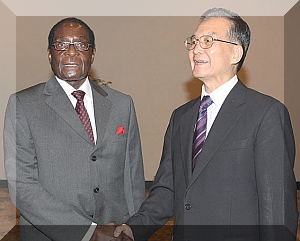Zimbabwe's Look East Policy: Healthy?

 |
| President Mugabe with Chinese Premier wen Jiabao. Photo courtesy |
Most analysts agree that China will break away from the
The eureka moment of the past decade that indicated that only one giant will remain standing, was the crippling global recession and consequent realisation that China holds vast global reserves, while the US lives increasingly on unsustainable credit. The US reliance on Chinese capital to stabilize its accounts signifies that the decline and fall of
Five hundred years prior to this crisis, what had given the West the edge over the East were five key features: the capitalist enterprise, the scientific method, global imperialism, the consumer society and the 'Protestant' ethic of work and capital accumulation as ends in themselves.
The new world order will not commence after China's economy overtakes that of the
Zimbabwe must now perfect the art of benefiting from
Geo-strategic Importance of Sino-Zimbabwe Relations
From the outset, it is important to note that looking East does not mean completely turning one’s back to the West. A great deal of emphasis has been placed on the need to re-engage the Bretton Woods institutions and détente with the West, and rightly so; however, this rapprochement must occur in simultaneity with a strengthening of economic relations with China, which has fast become of great geo-strategic importance to Zimbabwe on several fronts:
Firstly, President Mugabe's administration has had links with the Chinese government ever since China provided
Chinese authorities’ associations with the Second Chimurenga, and subsequent cordial political relations, have resulted in the crucial formation of an ideological alliance with a permanent member of the UN Security Council. This alliance has been unwavering throughout the Third Chimurenga, where China's support was instrumental in derailing attempts by Western nations to use the UN Security Council to put sanctions on the people of
Illegal economic sanctions have brought Zimbabwe and
From China's perspective, this long-standing alliance serves as a means of not only, improving political ties with its fifth largest trading partner in Africa, but also cultivating good relations with a nation that is strategically nestled between its two biggest African trading partners, namely
Crucially for China,
China's keen interest in
These strategic minerals include the second largest platinum deposits in the world, estimated at in excess of $500 billion; voluminous yet to be exploited coal-bed methane gas; vast coal reserves and immense hydroelectric power potential; as well as the geological treasure zone in the Great Dyke region, home to abundant deposits of copper, chromium, nickel and gold to mention but a few.
Secondly, China’s voracious appetite for these mineral resources has driven it to become the largest investor in
Finally, Beijing’s propensity to give
Over the past three years, China has provided approximately half a billion dollars to
Why should Zimbabwe look West and agree to voluntary lower its citizenry’s living standards on the back of exorbitant loans, when it can receive virtually interest free loans aimed at investing in development and improving people’s living standards, by simply looking East?
Chinese loans and grants on the continent last year amounted to more than $8 billion to Angola,
The economic shift eastward may have taken 500 years but the Zimbabwe Government must waste no time in perfecting the art of benefiting from
By Garikai Chengu.
Garikai Chengu is a scholar at
